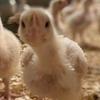Animal welfare during the pandemic
Published: May 10, 2021
Source : Dr. Prafulla Regmi, North Carolina State University. Reviewers: Dr. Shawna Weimer, University of Maryland; Dr. Marisa Erasmus, Purdue University; Dr. Leonie Jacobs, Virginia Tech.

Ensuring welfare of birds at the farm is key to maintaining a healthy supply of eggs and chicken during the pandemic
The COVID-19 pandemic has had a significant impact on various industries, including the poultry and livestock sectors. Livestock prices are expected to go down by as much as 12%, causing billions of dollars in losses. Some examples of COVID-19 impacts on poultry production include difficulty of moving live animals, disruption of supply chains (feed, bedding, vaccines), and limited access to labor and professional services. These could directly or indirectly affect the welfare of the birds at the farm.
COVID-19 and poultry welfare
Disruption in the production chain means overgrown birds at the farm that could face euthanasia or depopulation
Management tips for the farm during the pandemic
- Train all employees on CDC guidelines to maintain sanitation and hygiene
- Enforce strict biosecurity measures and maintain minimum external access to the farm
- Source out PPE (masks, gloves) in advance and maintain inventory
- Constant communication with state and federal agencies, processing plants, and input suppliers
- Develop an emergency plan with a veterinarian in case of a disease outbreak in the flock
- Plan ahead for extended stay of animals on farm in cases where processing plants are closed
- Be prepared to process animals in small batches and sell them locally
 Animal Welfare issues in times of a Pandemic
Animal Welfare issues in times of a PandemicThe closure of processing and packaging plants could lead to extended stay of market-ready chickens and turkeys at the farm. As birds continue to grow, they have less space.
Overstocking can cause stress, increase risks of disease, reduce litter quality, and cause behavioral issues such as aggression in birds. It also results in more restlessness and disturbance as birds have difficulty moving away from each other.
Although inter-state movement is not restricted in the U.S., certain states are beginning to impose travel restrictions and mandatory quarantines. This could lead to significant transportation stress, compromised animal welfare, and reduced product quality.
Disruption of a proper supply of feed, vaccines, medicine, and professional support are other factors that could be compromising welfare of poultry at the farm. Furthermore, waste disposal could be challenging, as prolonged housing of market-age birds results in build-up manure in the litter.
Potential Animal Welfare Solutions
There are certain strategies that could be employed at various points of production to minimize consequences for poultry welfare and potentially preventing large-scale depopulation of market-ready birds.




Other Considerations
- Lobbying with your state representatives and agencies to make provisions for green lanes for live poultry transport and keeping food markets open
- Following FDA and USDA guidelines on temporary changes in regulations that can benefit you to process and sell meat and eggs at local markets
This article was originally published on Poultry Extension Collaborative (PEC) and it is reproduced here with permission from the authors.
Resources
- AVMA-recommended euthanasia methods
- US Poultry and Egg Association - resources related to COVID-19
- National Chicken Council - resources related to COVID-19
- Guidance for poultry workers - CDC and the Occupational Safety and Health Administration
Related topics:
Authors:




Show more
Recommend
Comment
Share
12 de mayo de 2021
Very informative. In Kenya, welfare issues are becoming important in poultry production. Practice though is compromised due to many small growers, some of whom have no sufficient resources.
Recommend
Reply

Would you like to discuss another topic? Create a new post to engage with experts in the community.





















